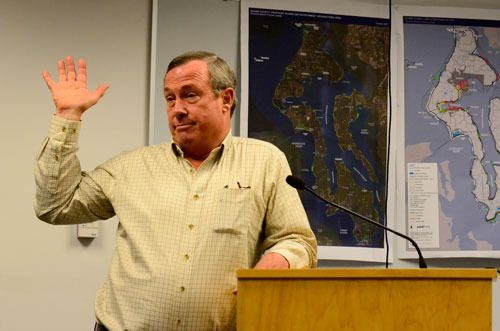The first of two scheduled public hearings concerning a long-range shoreline planning document update for Island County was held in Coupeville this week but how public beach access will be addressed remains unclear.
It’s been one of the most talked about issues since drafting of the shoreline master program update began in 2010 — a process required by the state every eight years — and it continued to be a point of disagreement for the public during Monday’s meeting with the Island County commissioners.
On one side, proponents lobbied for stiffer rules that would require future developments to incorporate public beach accesses, no matter how small or seemingly insignificant.
“We need those areas for public access. Period,” said Steve Erickson, legal coordinator for the Whidbey Environmental Action Network. “I don’t think it should be discretionary at all.”
Property rights advocates such as Jeff Lauderdale, a Coupeville resident and Island County commissioner candidate, maintained that regulations which force people to hand over private land to the public is nothing short of a government “taking.”
Instead, efforts should be focused on the identification of existing accesses so they can be utilized by the public, he said.
“I think we need to not handcuff ourselves to a taking of property,” Lauderdale said.
The shoreline master program is a planning document, required under state law, that will guide new and existing development within 200 feet of the ordinary high water mark over the next 20 years.
In response to comments about beach access received during a string of recent public meetings and over the past two years creating the plan, document authors have proposed several amendments.
Along with suggesting cooperative approaches, such as the implementation of financial incentive programs, county officials are recommending a continued effort to identify existing beach accesses.
At the same time, they suggested softening requirements for new developments of more than four homes but less than 10. They could dodge having to provide a beach access by paying a fee, money which would go toward the purchase of public shoreline elsewhere, or by creating an access for the new community only, not for use by the general public.
Salmon farming
Aquaculture also proved a hot topic with the public. A first draft of the rule update proposed salmon farming of local stocks only. Species such as Atlantic salmon would be strictly prohibited.
However, Karen Stewart, the county’s shoreline master program coordinator, said Washington Department of Fish and Wildlife officials have since made it clear that is a policy they will not endorse as farming wild stocks of salmon is not allowed in Washington.
Erickson got a round of applause from some in the crowd when he criticized Atlantic salmon farms as nothing more than “feed lots” run by multi-national corporations. They have no allegiance to the community and are focused solely on “extracting money and resources,” he said.
He recommended the board read the book, “King of Fish,” and fight to retain a strict ban on Atlantic salmon farming in areas where known diseases associated with the species might be transferable to native stocks.
He was one of several people to lobby the commissioners to take a hard stance on the issue and even challenge the state if need be.
“I would encourage the board, beg you, fight this tooth and nail,” said Robert Hrycenko, a Greenbank resident.
Not everyone who addressed the issue appeared to be of like mind, however. Clinton resident Rufus Rose stopped short of endorsing Atlantic salmon farming but did say he wished to offer a balanced perspective and suggested a book of his own.
“It’s called ‘The Great Salmon Hoax’,” Rose said.
In the end, the board took no action and agreed to continue the hearing until its next meeting
Nov. 19 in Coupeville.



